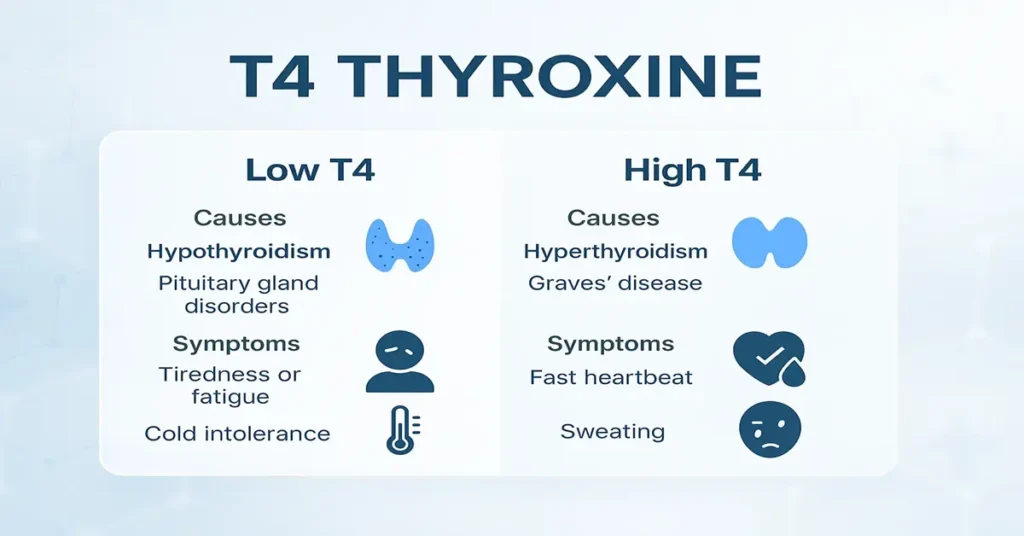Overview
The T4 (Thyroxine) Test measures the level of thyroxine hormone in your blood.
T4 is one of the two main hormones produced by the thyroid gland — the other being T3 (Triiodothyronine).
This test is crucial for assessing thyroid function and helps diagnose conditions such as:
- Hypothyroidism (underactive thyroid)
- Hyperthyroidism (overactive thyroid)
- Thyroiditis or other thyroid disorders
There are two types of T4 measurements:
- Total T4: Measures both bound and unbound (free) hormone.
- Free T4: Measures only the active form that circulates freely and is available for use by the body’s tissues.
Where is T4 Produced in the Body?
- T4 is synthesized in the thyroid gland, a small butterfly-shaped gland located at the base of your neck.
- The thyroid produces T4 when it receives signals from the pituitary gland, which secretes TSH (Thyroid Stimulating Hormone).
TSH acts like a messenger — it tells the thyroid how much T4 to release.
Once released, T4 circulates in the bloodstream, where most of it binds to proteins, while a small fraction remains free and active.
Main Functions and Importance of T4
T4 plays a vital role in maintaining your body’s metabolism and overall health.
Although it is less active than T3, it acts as a storage form of thyroid hormone that can be converted to T3 when the body needs it.
Main Functions of T4:
- Regulates Metabolism
Helps the body convert food into energy and maintain steady energy levels. - Controls Body Temperature & Heart Rate
Ensures your heart and cells function properly. - Supports Growth & Brain Development
Essential for growth, especially in infants and children. - Aids in Digestion & Muscle Function
Keeps digestion smooth and muscles active. - Maintains Mental Health
Low T4 levels can lead to mood swings or depression. - Acts as a Hormone Reservoir
T4 is converted into T3 in the liver and other tissues, providing a continuous supply of active hormone.
Simply put — T4 is like the “fuel reserve” of your body’s metabolism that keeps every cell active and energized.
Causes of Low T4 Levels
Low levels of T4 indicate that the thyroid gland is underactive or that the body is not converting or using thyroid hormones properly.
Common Causes:
- Hypothyroidism (underactive thyroid)
- Hashimoto’s thyroiditis (autoimmune disorder)
- Iodine deficiency (essential for thyroid hormone production)
- Pituitary gland disorders (low TSH leads to reduced T4)
- Certain medications (lithium, amiodarone, steroids)
- Severe illness or malnutrition
Symptoms of Low T4 Levels
When T4 levels are low, metabolism slows down, and body functions become sluggish.
- Constant tiredness or fatigue
- Weight gain despite normal diet
- Depression or low mood
- Cold intolerance (feeling cold even in warm weather)
- Slow heart rate
- Dry skin and hair loss
- Constipation
- Puffy face or swelling
- Menstrual irregularities
- Memory issues or brain fog
If untreated, chronic low T4 can lead to hypothyroidism, which may cause serious complications such as goiter, infertility, or heart disease.
Causes of High T4 Levels
High levels of T4 mean that your thyroid gland is producing too much hormone, resulting in hyperthyroidism.
Common Causes:
- Hyperthyroidism (overactive thyroid)
- Graves’ disease (autoimmune condition stimulating thyroid hormone overproduction)
- Thyroid nodules or goiter
- Thyroiditis (temporary inflammation of the thyroid)
- Excessive thyroid hormone medication
- High estrogen levels (seen during pregnancy or hormone therapy)
Symptoms of High T4 Levels
When T4 levels are high, your metabolism speeds up excessively, causing your body to burn energy too quickly.
- Rapid heartbeat or palpitations
- Anxiety, nervousness, or irritability
- Heat intolerance or excessive sweating
- Weight loss despite increased appetite
- Tremors or shaky hands
- Frequent bowel movements or diarrhea
- Insomnia (trouble sleeping)
- Fatigue even after rest
- Menstrual irregularities
Severe hyperthyroidism can lead to thyroid storm, a dangerous condition requiring emergency care.
Reference Ranges
Ranges may slightly vary between laboratories or based on age and gender.
| Test Type | Normal Range |
|---|---|
| Total T4 | 5.0 – 12.0 µg/dL |
| Free T4 | 0.8 – 1.8 ng/dL |
- Low T4 → Hypothyroidism
- High T4 → Hyperthyroidism
Sample Type and Testing Information
- Sample Type: Serum
- Tube Used: Red Top (Plain)
- Fasting: Not required (unless combined with other tests)
- Associated Tests: TSH, T3, Thyroid Antibodies
The test involves a small blood sample taken from a vein in your arm.
Results are usually available within 24–48 hours.
Test Preparation
- Avoid taking thyroid medication before testing (unless instructed).
- Avoid biotin supplements for at least 2–3 days before testing.
- Inform your doctor if you are pregnant or taking birth control pills, estrogen, or steroids.
- No special fasting is required.
When to Consult a Doctor
You should see your doctor if you notice:
- Unexplained weight changes
- Feeling unusually tired or anxious
- Irregular heartbeat or palpitations
- Hair loss, dry skin, or swelling
- Changes in menstrual cycles or sleep patterns
Abnormal T4 results may require further tests like TSH, T3, and thyroid antibody testing for accurate diagnosis.
Important Word Explanations
| Term | Meaning |
|---|---|
| Thyroxine (T4) | A thyroid hormone that controls metabolism and energy. |
| Triiodothyronine (T3) | The active form of thyroid hormone derived from T4. |
| TSH (Thyroid Stimulating Hormone) | Hormone from the pituitary gland that regulates thyroid activity. |
| Hyperthyroidism | Overactive thyroid gland producing excess hormones. |
| Hypothyroidism | Underactive thyroid gland producing insufficient hormones. |
| Graves’ Disease | An autoimmune disorder causing hyperthyroidism. |
| Hashimoto’s Disease | Autoimmune condition causing hypothyroidism. |
~END~

